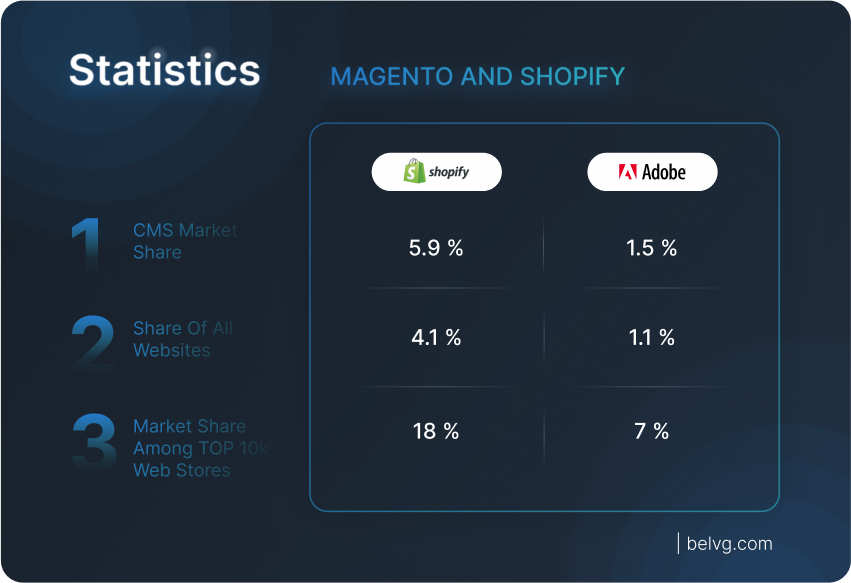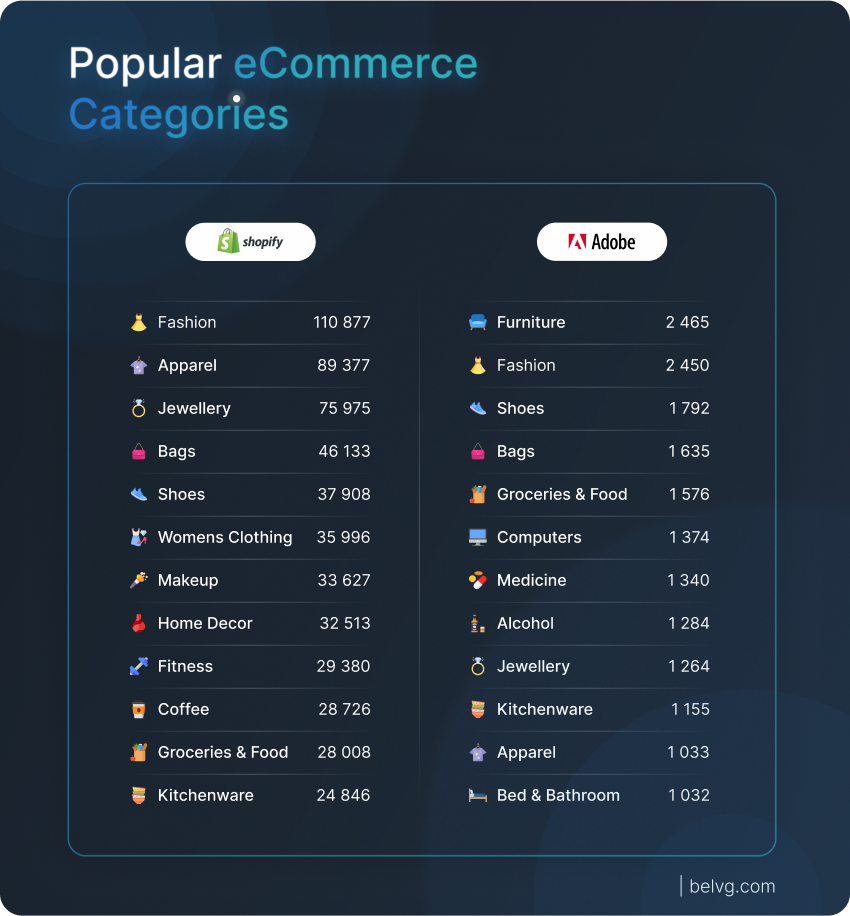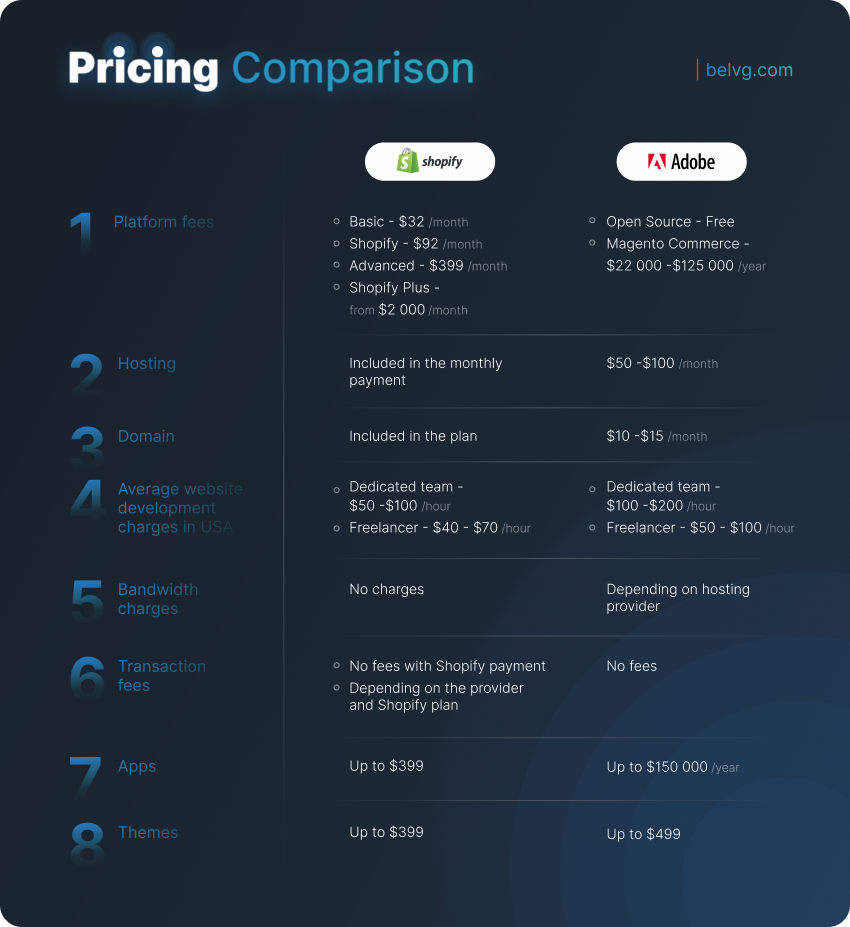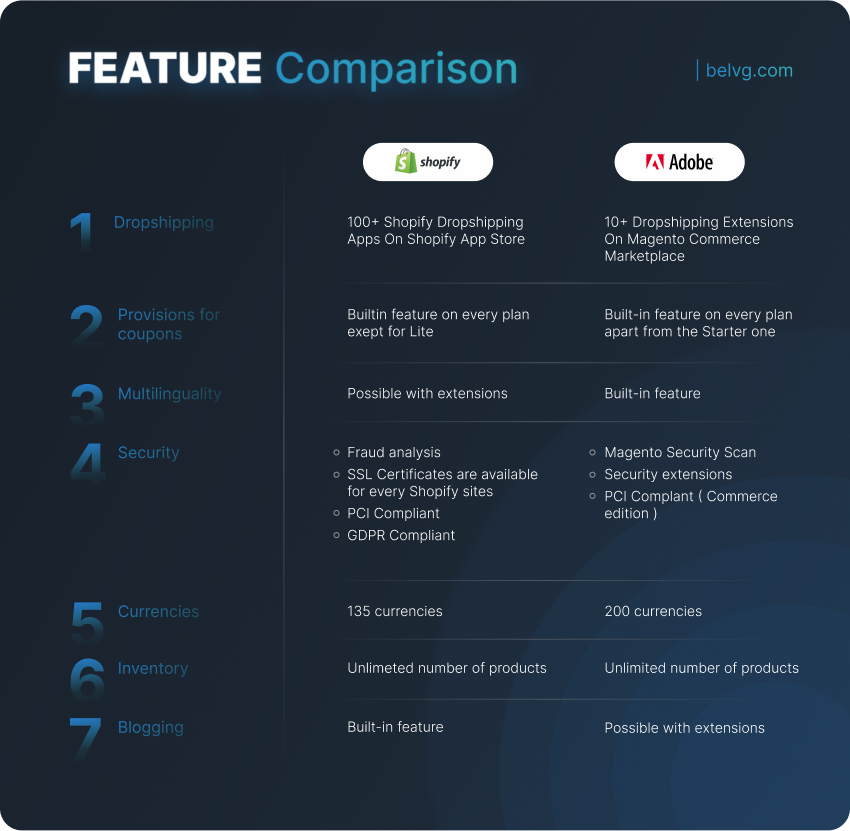
Magento and Shopify are top players in the world of ecommerce platforms. Both companies offer unique benefits for businesses in the online retail space.
Magento, an open-source platform, is renowned for its robust customization capabilities and scalability, catering to businesses with specific needs and technical resources. Shopify, on the other hand, shines as a user-friendly, hosted solution, ideal for businesses seeking ease of use and quick setup.
Shopify or Magento can be a pivotal decision for your online store, influencing everything from user experience to long-term growth potential.
We’ve crafted a comprehensive comparison review of Magento vs Shopify. This in-depth analysis delves into their core functionalities, pricing structures, scalability options, and more. Our Magento vs Shopify comparison guide will help you choose a platform that aligns with your business objectives and drives increased revenue.
Table of Contents:
Magento or Shopify – Which One is More Popular
Editions of Magento 2 and Shopify plans
Magento versus Shopify: Overall Review
Hosting
Pricing
Ease of Installation and Usability
Themes
Marketing, Sales and SEO Features
Apps and Extensions
Additional Features
Scalability and Flexibility
Support
Magento vs Shopify: Summary
Magento or Shopify – Which One is More Popular
Both platforms are leading the ecommerce market, and their popularity among the top 10k websites highlights their significance in the online retail landscape. However, the statistics for both platforms show notable differences.
Shopify:
- CMS Market Share: Shopify, now commands a notable 5.9% of the global CMS market.
- Market share among the top 10k web stores: Shopify has made impressive strides, now holding 18% of this market.
Magento:
- CMS Market Share: Magento, with its robust and flexible framework, is used by 0.7% of global sites. It’s particularly appealing for businesses that need advanced customization and scalability.
- Market share among the top 10k web stores: In the web stores, Magento’s presence is noticeable, with an 8% share.
Despite Shopify having a larger overall market share, Magento is favored by such giants as Ford, XBOX, Casio, Nespresso, and Canon. These enterprises demand websites that are robust, secure, and flexible, particularly in terms of payment options, shipping logistics, and design capabilities. This underscores Magento’s suitability for high-traffic, complex online stores.
Currently, it is challenging to provide updated data on the specific industries predominantly using Shopify versus Magento in 2023.
The divergence between Shopify and Magento is based on Shopify featuring visually appealing and stylish themes that require minimal adjustments with standard functionality. It particularly resonates with stores specializing in fashion, cosmetics, and footwear.
On the other hand, Magento’s popularity is pronounced among companies dealing in customized products, for example, furniture retailers. Magento seamlessly integrates intricate calculators and product builders.
Conclusion
Shopify stands out as one of the most widespread e-commerce platforms and a significant player in the CMS market. Its ease of use, a diverse range of themes, and an array of apps contribute to its popularity.
Conversely, Magento, while less popular, is a preferred choice for websites that demand flexibility and multilingual support. Although Magento attracts fewer companies than Shopify, the websites it powers often experience high traffic, highlighting its strength in supporting large-scale online businesses.
Editions of Magento 2 and Shopify Plans
Before getting to the feature battle of Magento vs Shopify, let us briefly differentiate between Magento versions and describe Shopify plans.
Magento Open Source and Magento Commerce
There are two versions of Magento CMS:
- Magento 2 Open Source, formerly known as Magento Community Edition;
- Magento 2 Commerce, which was recently renamed as Adobe Commerce.
In simple words, Open Source is a free edition – you can download it and modify the code. Using the platform, you can implement unique features, as long as you have enough coding knowledge.
Adobe Commerce is a paid edition. It tends to be superior to the Open Source edition: more secure and with such features as B2B functionalities and Content Staging.
These features, together with security and live support, are particularly significant for large catalogs. Small and medium businesses are good to go with the free option.
The main difference between the two editions is the price. Magento charges no fee for the Open Source solution. The license for Commerce edition costs from $22,000 to $125,000 per year, depending on the annual Gross Merchandise Value (GMV). GMV is the total amount of products sold by the company in a specific period.
The Adobe Commerce features that Open Source lacks:
- Better security
- 24/7 support from Magento including dedicated account manager and real technical specialist on the line
- Content Staging
- B2B features
- Live Search
- Custom Segmentation
Both options still offer:
- Marketing and promotion tools
- Checkout, payment, and shipping integrations
- Analytics and reporting
- Global selling
You can learn more about their differences in our detailed review of Magento Editions.
Shopify Pricing Plans
The platform offers three plans for an online store:
- Basic ($32/month) – the solution for a small business. It offers no built-in opportunity to sell internationally, you can only create two accounts for the staff, credit card rates are quite high, and the transaction fee equals 2%. So if the products are expensive or you are going to sell lots of them, the expenses will soon add up due to these additional charges.
- Shopify ($92/month) – option for a growing small business. Here you can create five staff member accounts, get monthly reports, and even create international pricing. Also, the credit card rates and transaction fees are lower. Starting from this plan, you are getting a full 88% discount from Shopify partner carriers. These features are not so significant for a starting business but take on new value when the store reaches the point of about $5,000 monthly revenue.
- Advanced Shopify ($399/month) – plan with 15 staff accounts, detailed advanced reports as well as lower transaction fees and credit card rates. This plan also includes features for international selling, so if you are going to grow to at least $10,000 of monthly revenue and maybe sell internationally, this is your plan. It is pricey, but lower additional rates and new features make up for that.

There is also a Shopify Plus solution for enterprise-level businesses and Shopify Lite. The latter integrates with an existing online solution and allows accepting credit cards and creating invoices.
Shopify versus Magento: Overall Review
When making a choice, you have to decide what is more significant for you: usability and a bunch of eye-pleasing themes that Shopify offers or the flexibility and scalability that Magento provides. The former is more recommended for aspiring business owners, while the latter is suitable for large brands and enterprises.
To compare the two systems, let’s move on to the features you need to consider:
- hosting
- pricing
- ease of installation and usability
- themes
- marketing, sales, and SEO features
- apps
- payment and transaction
- additional features
- scalability and flexibility
- support
Having compared platforms for each of these features, you can make the right decision.
Hosting
Shopify: The company takes care of all your hosting needs. You pay a monthly fee for both the CMS and the hosting services. Shopify utilizes a CDN hosting service provided by Fastly, which is a network of servers located around the world. This ensures that web stores load quickly regardless of the continent where your buyers are located.
Magento: Magento offers two versions of its CMS: Magento 2 Open Source (formerly known as Magento Community Edition) and Magento 2 Commerce, now rebranded as Adobe Commerce. Open Source is a free edition that you can download and modify. Adobe Commerce, a paid edition, offers enhanced security, cloud availability, B2B functionalities, and advanced marketing tools.
If you choose Magento, you need to handle the hosting solution yourself. You have the freedom to choose a more powerful or cost-effective hosting service. It is particularly relevant for the Open Source edition.
If you opt for an Adobe Commerce license, there is a choice between an on-premise version and a Cloud solution. With the letter, you gain access to pre-installed cloud features and cloud hosting with a choice between Amazon Web Services and Microsoft Azure. It provides the same benefits as any SaaS platform, including built-in security, performance optimization, and managed cloud infrastructure. It also employs a CDN system to prepare for peak traffic periods.
Conclusion
With Shopify, there is no option to choose: you pay a set amount and have limited control over the hosting. Nevertheless, the hosting provided is sufficient for small and medium-sized businesses.
Conversely, Magento offers the freedom to choose your provider, which can lead to cost savings: making the right choice means you only pay for what you use without the risk of overpaying. You also have the flexibility to switch plans as your business grows.
Pricing Comparison: Shopify vs Magento 2
Magento Pricing: Magento offers three main editions – Magento 2 Open Source, Adobe Commerce on Premise, and Adobe Commerce Cloud. Magento 2 Open Source is a free edition, while Adobe Commerce on Premise starts at $22,000 per year, and Adobe Commerce Cloud starts at $40,000 per year. The final cost for Adobe Commerce editions depends on the chosen license and additional packages, such as the B2B suite and business BI.
Custom Adobe Development
Take your online store to the next level with BelVG Magento custom development
Visit the pageRemember, these costs don’t include expenses for development, modules, and other maintenance needs. Therefore, the total cost of maintaining a Magento site can range from $50,000 to $250,000 annually, varying with the complexity and scale of the project.
Shopify Pricing: The platform, in contrast, offers a more straightforward pricing structure with its various plans. As of 2025, the plans include:
- Basic Shopify Plan at $32 per month
- Shopify Plan at $92 per month
- Advanced Shopify Plan at $399 per month
- Shopify Plus for enterprise-level businesses, starting at around $2,300 per month
Additionally, Shopify introduced a price increase in February 2023. However, subscribing to a yearly plan offers a discount, bringing the monthly costs for the ‘Basic,’ ‘Shopify,’ and ‘Advanced’ plans down to $24, $69, and $299, respectively.
Magento Support
- Bandwidth charges. Both platforms do not charge bandwidth fees. In the case of Magento, everything depends on the hosting provider – choose wisely or pay for extra users.
- Transaction fees. Magento charges no transaction fees and offers popular payment gateways such as PayPal, Braintree, and Authorize.net by default. Although you can use any other by installing an extension, you will have to pay only the fees of your chosen gateway. In this issue, Shopify offers other conditions: you can choose from more than 100 different payment gateways, but you have to pay transaction fees both to the gateway provider and to Shopify. Another option is to use Shopify payment which goes without any fees. Note that Shopify payment is only available in 23 countries, mainly North America and Europe.
- Theme cost. Shopify has a lot more theme choices than Magento. And they are cheaper. On the official marketplace, there are about 74 themes in total, 10 of which are free. Magento’s official shop offers only 11 themes, among them only 3 – for free. The other cost $25-699.
Shipping fees. Talking about the price, we should also mention shipping. Shopify partners with such carriers as USPS, DHL Express, UPS, and Canada Post. This partnership diversifies shipping methods and allows Shopify to offer customers a discount of up to 88%, depending on their Shopify plan. Magento integrates with standard carriers USPS, UPS, FedEx, and DHL and can work with other providers by installing an appropriate extension.
Conclusion
Shopify is cheaper. Even though it charges a monthly fee and requests transaction fees, the cost of themes, extensions, and web development fully covers that loss. Consider that Magento provides an opportunity to make a simple online store at the same price, but it will lack additional features or customized design.
And if you need a robust store with customized design and features, the prices are still comparable. Using Magento Open Source, you can create a personalized online store from scratch: you will probably pay a lot for development and an appropriate hosting provider but will get what you need.
To create a customized shop on the Shopify platform, you will have to pay for an Advanced plan or even Shopify Plus, find a developer, and download apps that can make the website slower. The price will remain high while the efforts will grow. Still, it can not guarantee successful customization because Shopify is not open source. It means that they keep most of the data for changing a web store.
Ease of Installation and Usability
Shopify: As a Shopify admin, it’s simple to modify fonts, and colors, or rearrange layout blocks. Moreover, Shopify’s app marketplace offers a range of apps that can often be installed without any coding knowledge.
However, it’s important to note that overutilizing these apps or not managing them properly can lead to compatibility issues. In such cases, the assistance of a developer or support from Shopify might be necessary to resolve these challenges. This blend of user-friendliness and flexible app integration makes Shopify a popular choice for those with basic technical skills to build and maintain a functional online store.
Magento: In the battle of Adobe Commerce vs Shopify, Magento is known for being more in-depth and complex. It requires a certain level of technical knowledge to navigate and manage effectively. However, the advantage lies in its customizable backend system, allowing detailed management of the store. This complexity means that Magento often requires a developer for installation and administration, but it offers flexibility and customization options that Shopify lacks.
Magento Marketplace has over 5,000 extensions, including 1,970 free ones, but they often require coding knowledge to install. It can be a downside compared to Shopify’s more user-friendly app offerings.
Conclusion
Shopify emerges as the more accessible platform, particularly for users without extensive development skills, offering an easy-to-use drag-and-drop solution for building an ecommerce website.
Meanwhile, Magento, despite its complexity and the need for professional developers, allows for more extensive customization of the store’s functionality.
Themes
Themes play a pivotal role in shaping the online store’s appearance and customer experience. They set the aesthetic tone and should align with the products. So, Shopify vs Magento 2: what themes to choose?
Our Experience with Custom Magento Theme
If no ready-made theme is suitale for your store, we can make a custom one
Check out the caseMagento Themes: Magento offers just 11 core themes, all built for extensive customization. Unlike Shopify, where themes are typically used with limited modification, Magento’s themes are designed to be tailored by developers.
This approach means that every Magento theme, even those not found on the official marketplace such as Hyvä themes, is inherently customizable from a front-end perspective.
But Magento themes generally require the skills of a professional developer, catering more to businesses with larger budgets and specific design needs.
Shopify Themes: Shopify’s theme library, scoring well in design research, offers both free and premium options. With 10 free and over 60 premium themes, the platform targets a range of aesthetic preferences and budgets.
Shopify’s themes stand out for their user-friendliness; they are pre-populated and ready for elementary customization. Users can change color palettes, resize elements, and integrate social media feeds without coding expertise. For deeper customization, a developer is needed.
Conclusion
While Shopify offers a wide variety of affordable and easy-to-customized themes for a quick launch, the platform primarily focuses on aesthetic changes and user-friendliness. Magento, with a slightly higher score in this category, provides a more diverse range of themes, including both ready-made and custom options. The custom themes, although more costly, offer a higher degree of personalization. Each platform serves different needs: Shopify for those prioritizing ease and speed, and Magento for those seeking depth and customization in their store’s design.
Marketing, Sales and SEO Features
Imagine selling quality, original, and reasonably priced products, but they don’t sell as well as inferior alternatives from competitors. This scenario often results from differing marketing strategies and tool usage. Let’s delve into the updated marketing tools, sales tools, and SEO features that Magento or Shopify offer as of 2025.
Marketing Tools
Shopify: Shopify merchants can connect with the Google Ad network and Pinterest through Shopify Audiences, and use JavaScript for Shopify Functions. They have also introduced a customer self-serve returns feature, streamlining the returns process.
Magento: Magento emphasizes creating engaging content, utilizing social media for marketing, and listing products on online marketplaces like Amazon and eBay. Email marketing and retargeting are integral, with options for influencer collaborations and voice search optimization.
SEO Features
Shopify: Shopify’s SEO approach in 2025 includes:
- Developing a logical internal linking strategy with menus.
- Submitting sitemaps to Google Search Console and fixing site errors.
- Optimizing images for quick loading and search engine discovery.
- Conducting keyword research, matching search intent, and creating relevant pages.
- Content optimization to enhance visibility.
Magento: Magento provides SEO optimization features to enhance online store visibility in organic search. While some features are enabled by default, they require additional tweaking for optimal performance.
Sales Tools
Shopify: A significant update includes the launch of a new one-page checkout, designed to be shorter and faster, and the support for product bundles through its Storefront API.
Magento: Magento offers a variety of sales extensions such as Zendesk Connector for customer support, Smart One Step Checkout for an efficient checkout process, and Mautic Integration for marketing automation.
Conclusion
Shopify and Magento continue to develop their platforms, each with a distinct focus. Shopify simplifies the online selling experience with integrated advertising options and a streamlined checkout process. Magento is known for its customization and variety of extensions.
Apps and Extensions
Apps and add-ons are essential when built-in functionalities fall short. For example, apps are crucial for Shopify stores if you need to work with third-party payment gateways.
Both platforms offer a substantial range of options. Let’s explore the differences as of 2025:
Shopify: The platform now boasts over 8,000 apps in its official app store. While the exact pricing of these apps can vary widely, many are free, and the rest are typically between $20-50, with some reaching up to $400 or more. Shopify’s app store is moderated, ensuring functionality, but compatibility issues can arise due to apps being developed by different creators. It can occasionally lead to conflicts where installing one app might cause another to malfunction.
Magento: Magento’s official marketplace offers 3,700+ extensions for marketing, sales, shipping, or SEO. Installation typically requires more technical skills, including a moderate level of coding knowledge. The pricing of these extensions varies, with many under $40, although some can be significantly more expensive.
Conclusion
In 2025, Shopify apps outnumber Magento extensions and are generally more affordable. Magento offers extensions that can cost significantly more but are designed to tackle serious challenges. For minor issues, Magento developers can create custom solutions.
Additional Features
Both Shopify and Magento offer a range of additional features that cater to various aspects of ecommerce, particularly in marketing and direct sales. However, there are noticeable differences in the functionalities they provide.
Dropshipping Capabilities: Shopify continues to excel in dropshipping, primarily due to its integrated feature with Oberlo. It allows easy access to a broad network of suppliers without installing additional apps. As of 2025, Shopify has further streamlined this process. On the other hand, Magento, while offering dropshipping solutions, still relies heavily on extensions, which may require additional setup and costs.
Hosting and Security: Shopify remains a hosted platform, ensuring robust security features, including PCI compliance, GDPR compliance, and SSL Certificates. Magento Commerce on Cloud version boasts advanced security features. The Open Source and Commerce on-premise versions’ security partly depends on the hosting provider, but they do support features like two-factor authentication for administrators.
Blogging and Content Management: Both platforms facilitate blogging, but Shopify offers a more user-friendly approach with its integrated functionality. Magento, while not having built-in blogging capabilities, provides access through various extensions offered by its partners.
Conclusion
As of 2025, Shopify’s additional features, predominantly built-in, remain straightforward and suitable for standard ecommerce shops. However, custom features still require hiring a Shopify developer, which can be both challenging and costly.
Magento, in contrast, caters to those seeking customization and advanced features. Its strengths lie in built-in multilingual support and extensive currency options, making it a more viable option for businesses targeting a global market.
Scalability and Flexibility
Both platforms continue to offer extensive scalability options for their clients. Magento, designed with scalability at its core, seamlessly supports serious brands in their growth journey. It is well-equipped to handle high traffic volumes and a diverse range of products. A notable feature of Magento is its ability to manage multiple stores in various languages from one admin panel. As businesses grow, Magento’s infrastructure can adapt, often necessitating a switch to more robust hosting solutions to accommodate this expansion.
Shopify, while initially perceived as less scalable than Magento, has significantly improved in this area. Starting from a small-scale Shopify Basic plan, businesses can evolve to higher tiers like Advanced Shopify and eventually to Shopify Plus, which is tailored for enterprise-level operations.
In terms of flexibility Shopify vs Magento Commerce, second maintains its superior position. Shopify can sometimes face limitations in terms of page loading speed and irreversible changes after certain modifications. Magento, with its open-source nature, presents a vast playground for developers to create bespoke solutions, although it requires professional development expertise to fully leverage its capabilities.
Conclusion
As of 2025, while both Magento and Shopify provide substantial prospects for business growth and development, Magento remains the more suitable choice for businesses planning for significant expansion and global outreach. Its ability to handle high traffic and its built-in features for global sales are particularly appealing to serious brands. Conversely, Shopify, with its user-friendly interface and scalable plans, is an excellent option for small to medium businesses that find standard ecommerce functionalities sufficient.
Support
Practical support is essential, particularly for users lacking technical expertise.
Shopify offers 24/7 phone support, email, and live chat assistance. The platform’s community resources have also expanded, now including more comprehensive forums, detailed API documentation, and an array of video tutorials that are easily accessible and understandable for beginners. Shopify has further enhanced its support system, incorporating AI-driven tools and resources to provide quicker and more efficient problem-solving.
For Magento, the support system remains differentiated based on the version used. Users of the Magento Open Source edition still do not have access to live support. However, Adobe Commerce users benefit from a dedicated account manager and access to technical specialists for in-depth assistance. The Magento community, now over 500,000 partners, continues to be a valuable resource for users of the Open Source edition, offering a wide range of guides, documentation, and tutorials for various issues.
Conclusion
Shopify stands out for its comprehensive and easily accessible support system, offering multiple avenues for technical assistance, which is a standard expectation from a reliable hosting provider. In contrast, Magento’s support system is more decentralized, often requiring users to rely on their hosting provider or a dedicated developer for Magento-related issues. This approach can be suitable for businesses with a more technical background.
Magento vs Shopify: Summary
In summarizing Shopify versus Magento, we see two distinct paths.
Magento emerges as a robust, highly flexible solution, ideal for handling high traffic and supporting an extensive range of products. Its global reach capabilities and rapid expansion potential are notable, yet this comes with a need for dedicated technical expertise. Important to remember about the requirement of an in-house developer or team and higher costs, particularly for an Adobe Commerce license.
Shopify, on the other hand, could well claim ‘user-friendliness’ as its middle name. Its intuitive drag-and-drop builder simplifies store creation, making it accessible for beginners. The platform offers numerous built-in sales and marketing features, reducing the need for significant changes in small to mid-range businesses. However, as businesses grow, the need for customization increases and Shopify’s reliance on apps for serious changes can sometimes lead to complexities or irreversibilities.
Choosing between Magento or Shopify doesn’t result in a clear winner or loser; it’s a decision that should be based on the specific needs and scale of your business. It’s crucial to analyze your choice carefully and be ready to pivot if your business demands evolve.
| Feature | Magento | Shopify |
|---|---|---|
| Ease of Installation | Requires developer | User-friendly, easy drag-and-drop builder |
| Customization | Extensive, coding knowledge | Limited without coding knowledge, relies on apps |
| Pricing | Higher initial cost, better for large enterprises | Lower initial cost, better for small businesses |
| Sales and Marketing Tools | Advanced, often require extensions | Built-in and straightforward to implement |
| SEO Features | Robust and built-in | Requires additional apps |
| Checkout Customization | Highly customizable | Basic customization options |
| Themes and Design | Limited number but highly customizable | Wide range but less customizable |
| Scalability | Built for scalability, handles high-traffic | Scalable with plans to match business growth |
| Flexibility | Open-source, flexible for developers | Less flexible, dependent on apps |
| Apps and Extensions | Extensive with developer assistance | Extensive, more user-friendly |
| Additional Features | International focus requires extensions | Simple, built-in features, less international focus |
| Support | Limited for Open Source, 24/7 dedicated manager for Adobe Commerce | Comprehensive 24/7 support |
| Best For | Businesses seeking custom solutions and scalability | Businesses wanting ease of use and quick setup |
When to Choose Magento:
- You need a high level of customization and access to developer resources.
- Your business requires a sophisticated online store with a lot of customization.
- You are targeting global markets and need a website with international capabilities.
- You plan on a multistore, marketplace, or a shop for B2B buyers.
When to Choose Shopify:
- You’re a small to medium-sized business that prioritizes ease of use.
- You want to set up your online store quickly without a steep learning curve.
- You need a cost-effective solution with a predictable pricing structure.
- You are a dropshipper









Thank for sharing such a great article about Magento Web Development Company
The main difference between the two is that Shopify is a hosted platform, while Magento is self-hosted. A hosted platform, such as Shopify, takes care of all your hosting worries for you. All hosting costs are included within your monthly plan, with no extra effort or expense required from you.
In this article I have found tips that are insanely helpful. Like you mentioned friends day in a perfect way. Thank you for sharing.
Reading your article satisfies the technological trends coming up from the last decade.
Enjoyed reading the article above, really explains everything in detail, the article is very interesting and effective.
Thank you and good luck with the upcoming articles
Nice blog tried to keep honest information between both platforms. Magento and Shopify both are highly recommended website builders. Latest Magento 2 offering a lot more advantages.